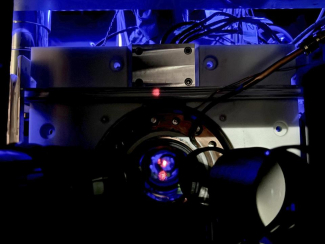JILA and NIST Fellow and University of Colorado Boulder Physics professor Jun Ye and his team at JILA, a collaboration between NIST and the University of Colorado Boulder, have developed an atomic clock of unprecedented precision and accuracy.
This new clock uses an optical lattice to trap thousands of atoms with visible light waves, allowing for exact measurements. It promises vast improvements in fields such as space navigation, particle searches, and tests of fundamental theories like general relativity. The clock's precision can detect microscopic relativistic effects and might redefine the second as a time unit. The results of this ultraprecise clock were accepted for publication in Physical Review Letters.
Read the full story about this advancement in clock technology at the NIST website.



 The Physics Frontiers Centers (PFC) program supports university-based centers and institutes where the collective efforts of a larger group of individuals can enable transformational advances in the most promising research areas. The program is designed to foster major breakthroughs at the intellectual frontiers of physics by providing needed resources such as combinations of talents, skills, disciplines, and/or specialized infrastructure, not usually available to individual investigators or small groups, in an environment in which the collective efforts of the larger group can be shown to be seminal to promoting significant progress in the science and the education of students. PFCs also include creative, substantive activities aimed at enhancing education, broadening participation of traditionally underrepresented groups, and outreach to the scientific community and general public.
The Physics Frontiers Centers (PFC) program supports university-based centers and institutes where the collective efforts of a larger group of individuals can enable transformational advances in the most promising research areas. The program is designed to foster major breakthroughs at the intellectual frontiers of physics by providing needed resources such as combinations of talents, skills, disciplines, and/or specialized infrastructure, not usually available to individual investigators or small groups, in an environment in which the collective efforts of the larger group can be shown to be seminal to promoting significant progress in the science and the education of students. PFCs also include creative, substantive activities aimed at enhancing education, broadening participation of traditionally underrepresented groups, and outreach to the scientific community and general public.